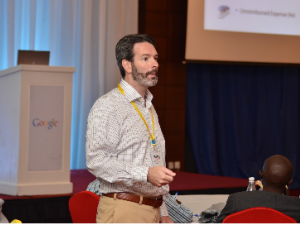You are here
Add new comment
Lessons from Startup Grind Kampala
Submitted by richardzulu on 28 October 2014 - 2:25pm
Startup Grind took place on October 20th at the Sheraton Kampala hotel. It brought together up-to 100 participants for a morning of learning how to split equity fairly between co-founders in a startup from the author of Slicling Pie, Mike Moyer. October 20th - 24th was Google for Entrepreneurs week and as such, Mike Moyer delivered the session in 4 other cities in Africa.
Sharing equity is a challenge most startups all over the world face, how to determine what each one should have. Allocating equity, is otherwise known as Slicing pie for those who are wondering.
#1: You should give people the fair market rate in the startup
More times that not, we all start out without money to pay for great people. However, this does not justify us paying low salaries to contributors within our startup. Using equity to compensate contributors, can be one of the most important tools to attracting and maintaning talent.
#2: The allocation of equity should depict the risk that individuals take when they make contributions to a company.
Equity represents risk, which is Your share % = (the total value of your contribution/the total value)
Most times, many startups start with a fixed equity split, this is where equity is split and it remains fixed, maybe until new negotiations happen.
Slicing pie is all about being fair to each and everyone contributing to your initiative.
This enables one avoid the allegator pit, where a number of individuals are disappointed with their share of the pie. Enter the “Dynamic Split” one that allows ownership percentages to adjust without the need for renegotiation.
The more you contribute to a startup, the more you get in terms of equity and ownership.
However, it is not easy to do that and as such, you can use the allocation framework: one that enables you allocate and recover equity
Your Share % = ( The Proxy Value of Your Contribution / The Total Proxy Value)
Proxy value means the relative value of your contribution. Many times, knowing the actual value of a pie is really hard when starting out, thus easier to use the relative value.
Your contribution can be a cash or non-cash contribution. Non-cash contributions can include Time.
To determine your contribution, the value can be calculated as:
Cash contribution = Fair market value * 4
Non-cash contribution = Fair market value * 2
Cash contributions are weighted heavily becuase:
-
It is much harder to replace cash when you are forming a company, you only burn it.
-
No cash = No business, every business needs cash to survive
-
Weighting cash allows founders to keep and maintain a big chunk of their business
The best way to retain equity is to simply pay in cash.
Therefore, your share of the pie will then be:
Your share % = (Your contribution / total contributions by everyone)
Let us use an example to illustrate this:
Imagine you hire a business analyst to work on your startup for a year. Their market value would have been USD 12000 for a year, if they earn USD 1000 per month. This is how much you should pay them per year if you had money. Given that you are running a startup, you should multiply their market value x2 given that they are assuming risk by working in your startup.
We divide that by 2000 to enable us calculate the slices per hour. 2000 hours because 40 hours per week times 50 weeks per year.
Let us assume you are only able to pay them USD 5000 for the whole year.
To get the number of slices every hour = (12000-5000)x2/2000 = 7 slices per hour.
Great, now that you can calculate the hourly rate of the business analyst, you will of-course have to track their time. How much time have they spent working on the startup in order to know the value at the end of the year. I know, this is too much work however, that is the only way to keep things fair. Of-course, the best way to work with time is by putting milestones to it. The hours are accrued only and only when a given milestone is reached.
Those are the two lessons I could share from Startup grind Kampala.
What next:
Are you interested in what you have read and would like to implement it. You can get a free sample of Slicing Pie here
You can also reach out to me on zulu@outbox.co.ug, Startup Grind Kampala Chapter Director
About Google for Entrepreneurs
Google for Entrepreneurs provides financial support and the best of Google's resources to dozens of coworking spaces and community programs across 125 countries. We also create Campuses: physical hubs where entrepreneurs can learn, connect, and build companies that will change the world. To learn more about Google for Entrepreneurs, visit google.com/entrepreneurs or follow us on G+ (+GoogleForEntrepreneurs) and Twitter (@GoogleForEntrep).
About Startup Grind
Startup Grind is a global startup community designed to educate, inspire, and connect entrepreneurs. It is powered by Google for Entrepreneurs. We host monthly events in more than 100 cities and 42 countries featuring successful local founders, innovators, educators and investors who share personal stories and lessons learned on the road to building great companies. Our monthly fireside chat interviews, startup mixers and annual conferences provide ample opportunities to connect with amazing startups and the people behind them, tap into a strong support network, form meaningful connections and gain inspiration for the startup journey ahead. Started by Derek Andersen and Spencer Nielsen in February 2010 in a small office in Mountain View California, the original goal to bring together friends who would help each other has spread across the world.


